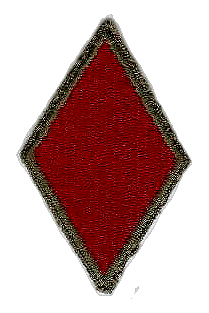Yves J. Bellanger

THE 5TH INFANTRY DIVISION
"RED DIAMOND"

 EAST WARD HO
Having proved its ability at Angers
the division was ordered to proceed eastward. The 11th Combat
Team went to Château-Gontier in XX Corps reserve while the
division, less the 2nd Combat Team, moved in an all-night march
of the 12th August a distance about 104 miles to St Calais. The
2nd CT remained in Angers area to mop up until relieved by the
80th Division on 14 August. The 11th CT, after reaching Château-Gontier,
remained in Corps reserve for four hours, then made an all-night
motor march of 94 miles to the division concentration area in
St Calais. After outposting a perimeter OPLR, the division bivouacked
for the night, then picked up and moved twenty-five miles northeast
to Authon, bivouacked for the night again and headed east toward
Chartres, gateway to Paris, on the 15th and 16th.
In such manner, did the division move,
tired troops pushing themselves to move and refreshing themselves
with forty winks in every possible moment. They learned to sleep
bouncing along the highway under a hot sun while sprawled on a
jeep trailer or with an arm hooked to a support on a tank. Reconnaissance
elements seldom rested there was so much territory to cover.
These items became familiar sights
in the seven hundred mile saga as the Red Diamond swept through
wooded hills, rolling plains, liberating thousands of villages
and larger towns:
EAST WARD HO
Having proved its ability at Angers
the division was ordered to proceed eastward. The 11th Combat
Team went to Château-Gontier in XX Corps reserve while the
division, less the 2nd Combat Team, moved in an all-night march
of the 12th August a distance about 104 miles to St Calais. The
2nd CT remained in Angers area to mop up until relieved by the
80th Division on 14 August. The 11th CT, after reaching Château-Gontier,
remained in Corps reserve for four hours, then made an all-night
motor march of 94 miles to the division concentration area in
St Calais. After outposting a perimeter OPLR, the division bivouacked
for the night, then picked up and moved twenty-five miles northeast
to Authon, bivouacked for the night again and headed east toward
Chartres, gateway to Paris, on the 15th and 16th.
In such manner, did the division move,
tired troops pushing themselves to move and refreshing themselves
with forty winks in every possible moment. They learned to sleep
bouncing along the highway under a hot sun while sprawled on a
jeep trailer or with an arm hooked to a support on a tank. Reconnaissance
elements seldom rested there was so much territory to cover.
These items became familiar sights
in the seven hundred mile saga as the Red Diamond swept through
wooded hills, rolling plains, liberating thousands of villages
and larger towns:
Item: Streets of liberated cities lined with old men and women,
young girls (but seldom young men as the Nazis had exported them
for labor or had killed) and children, all shouting "Vive
l'Amérique" and throwing flowers and bottles of cognac,
calvados and wine at passing jeeps and command cars or running
out of the crowd with a bottle and glasses to pour drinks for
the thirsty Americans.
Item: An occasional German or French collaborateur, with jaw set,
unseeing eyes staring straight ahead, clothes torn, being led
through the streets of a town with a French crowd at his heels,
jeering him with all the contempt of four suppressed years as
they conducted him toward a quick rendez-vous with death or, if
he was lucky, just jail.
Items: The pathetic figures of some French women having their
heads shaved for having been friendly with German occupation troops;
officers studying maps at ill-defined cross-roads and studying
the blue-colored phase lines on the map as the vehicular radios
crackled with orders from higher headquarters to advance to the
next phase line or patrol the flank; little kids tugging at Yanks'
shirtsleeves or running alongside jeeps yelling "cigarette
pour papa" or "bonbon pour moi" or a hopeful "chocolat"?;
old men, grateful for deliverance from the German yoke no matter
what the cost, stepping over their dead livestock, killed by American
artillery or mortars, to offer soldiers a drink of "vin ordinaire"
or the throat-tearing calvados or mirabelle; truckloads of German
prisoners amazed at the equipment of the Americans; French families
trundling their most precious possessions out of a battle area
in baby buggies and homemade carts and then trundling them back
again to shell-torn, bomb-blasted homes; bicycles of all types
and sizes being ridden by Frenchmen and women of all types and
sizes; swastika flags being torn down and the French Tricolor,
U.S. Stars and Stripes and the British Union Jack being hoisted.
Those and countless other little human
dramas made up the kaleidoscope of scenes as the 5th Division
swept eastward.
Pages 13 and 14 of the History booklet
of the 5th Infantry Division, published at Metz, France,
in December 1944.
The story continues in Battle
of Chartres page.
Battle of Chartres
Home

 Back
Back

This page hosted by  Get
your own Free Home Page
Get
your own Free Home Page
 All rights reserved, Yves J. Bellanger
Created in July 2001
Updated July 20, 2001 by Yves
J. Bellanger
All rights reserved, Yves J. Bellanger
Created in July 2001
Updated July 20, 2001 by Yves
J. Bellanger

